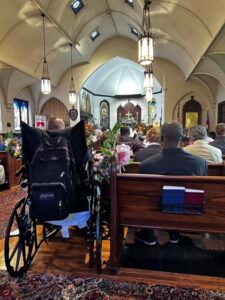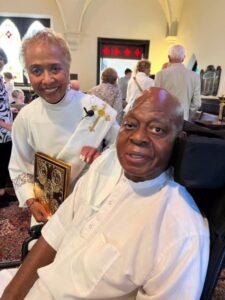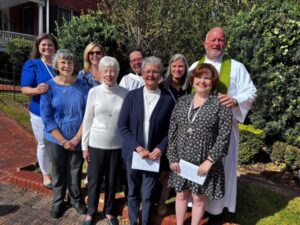Introduction
Some Christian denominations appoint clergy to a church to fill a vacancy. Denominational leaders make the assignments, the clergy dutifully comply, and the church accepts whoever is appointed. It is the “arranged marriage” model of clergy-church relationships. In the Episcopal Church, parishes and clergy participate in an “open call” search process, much like traditional job search models. After a priest departs from a community, no matter the reason, the parish begins a search to fill the void. The vacancy is publicized, and any priest may enter the process. This established search process model is more like traditional dating, with a courtship leading to a formal relationship. The goal is to find “Mr. or Mrs. Right” and enter a productive, long-term priest-parish relationship. If both parties are honest, authentic, and place the needs of the other in highest priority, a lasting partnership can develop. At least for a while, the priest and parish can enjoy a season of “happily ever after.” There is often a neglected, if not forgotten, third party in this relationship: God. In order for priest and parish to live together in a God-centered relationship, it follows that God should also be involved in the courtship. The established search process provides for a thorough two-party evaluation. However, it is not instructional as to how both parties might invite God into spiritual discernment, practice intentional listening, and allow space for God’s revelation.
Context
The established parish search process involves stabilizing the congregation with temporary, interim clergy and selecting a representative search committee. Ideally, the congregation participates in various exercises of introspection resulting in a Parish Profile that reflects the parish’s identity and needs. At this point, the vacancy is publicly announced, and any priest may enter the search process. The search committee receives and interviews applicants, evaluating each and reducing the list to final candidates. The parish leadership, or Vestry, makes a final choice, and subject to bishop’s approval, the call of a new priest is made[1].
Alas, like the many challenges singles face in the dating scene, clergy and churches have many requirements, pressures, and influences that can both guide and skew the process. The first question to address is the urgency to replace the previous priest. In Episcopal churches, the lack of a stable priest tends to suppress the possibility of parish sustainability and growth. C. Kirk Hadaway reports, “The loss of a priest and the process of living without a priest … can be quite disruptive and lead to decline.”[2] The parish is reluctant to return to the “dating” scene, and this perceived urgency can lead to rushing the process.
Similarly, clergy looking for a new call, perhaps without current employment, are motivated to present their best selves to achieve the offer of the call. As in traditional job interviews, candidates may present themselves as the best choice, no matter the reality. Personal requirements, preferences, and influences can take precedence over engaging in a divinely led process.
Challenges Exposed
The research of this project has revealed many challenges that may thwart divine intention in  matching a priest to parish resulting in the best fit for both. For the parish, there is a perceived time urgency that leads to rushing the process. The parish search committee also tends to be less than authentic in the Parish Profile, offering the most enticing picture for potential candidates. Most search committees, while faithfully offering their time and efforts, often lack experience in “human resources” and are less than effective in the interview process. Personal preferences and agendas can carry the day. Interviews with former search committee participants revealed there is a tendency to prefer a candidate that reminds the committee of a former priest that was present during a “golden age” in the parish, despite the reality that the current context is very different. Due to pressures from the congregation in what is typically a long process (~12 months), the primary goal seems to be to fill the vacancy, rather than find the best candidate.
matching a priest to parish resulting in the best fit for both. For the parish, there is a perceived time urgency that leads to rushing the process. The parish search committee also tends to be less than authentic in the Parish Profile, offering the most enticing picture for potential candidates. Most search committees, while faithfully offering their time and efforts, often lack experience in “human resources” and are less than effective in the interview process. Personal preferences and agendas can carry the day. Interviews with former search committee participants revealed there is a tendency to prefer a candidate that reminds the committee of a former priest that was present during a “golden age” in the parish, despite the reality that the current context is very different. Due to pressures from the congregation in what is typically a long process (~12 months), the primary goal seems to be to fill the vacancy, rather than find the best candidate.
Clergy also perceive an urgency to receive a new call, whether due to their discernment that it is time for a change from their current call, or the vocational and fiscal needs due to unemployment. Survey of clergy revealed location as a primary factor in pursuing and accepting a new call, over where a priest might be divinely directed. Priests also tend to consider a new call with respect to “climbing the ecclesial ladder.” Many priests pursue positions in larger parishes, which often carry greater compensation and the prestige of leading a larger, more established parish. Priests do not tend to move to smaller or struggling parishes, even when the vocational challenges and fit better match the clergy’s gifts. Any job search can be perceived as a challenge or “contest”, where the goal is to “win” by receiving the coveted call. Like any job applicant, clergy tend to present their best selves and suggest they are the best candidate for the opening.
Findings and Recommendations
The challenges and influences present in the current search process require intentional pursuit of divine discernment. God must be invited through prayer and listening at the initial phases of search committee selection and congregational preparation and involvement. Authentic reflection and courageous statement of the community’s history, identity, opportunities, and challenges is paramount in presenting the parish to potential candidates. Clergy consultants are available, though underused, to guide and be an unbiased advocate for the parish. Intentional prayer and listening exercises can center and focus the search committee on their work and create a space for the Holy Spirit to be an active member of the team and process.
Clergy must also pursue an honest “self-inventory” of their gifts and all influences that might affect their participation and activity in a search process. Spiritual Directors and other councils should be engaged to help clergy candidates remain divinely centered in their motivations, decisions, and discernment.
Search committees and clergy candidates are both pursuing long-term efficacy of the selection process. An ineffective call can cause lasting damage to the parish, the priest, and the larger Church. The future of thriving parishes depends on the foundational relationship of priest and parish. Clergy and search committees must improve the current search process to include spiritual discernment to achieve the kingdom goals God has planned for us.
[1] John Vonhof, The Alban Guide to Managing the Pastoral Search Process (Bethesda, Md.: Alban Institute, 1999), 1–102.
[2] C. Kirk Hadaway, “New FACTS on Episcopal Church Growth and Decline” (Domestic and Foreign Missionary Society, 2015), 30.
